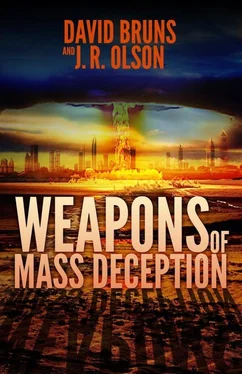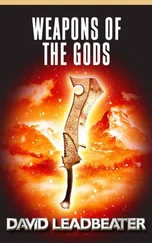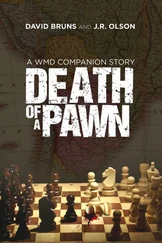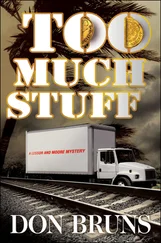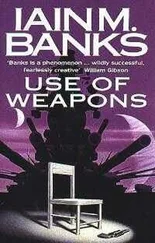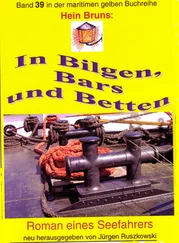“Look at it!” Aban’s face was flushed, and his voice cracked. “The Americans are leaving Iraq, walking away after eight years, leaving a Shia government in place. What an opportunity for our country! And what do our politicians do? They sit on their hands and worry about Israel and the United States taking action against us.
“This is our time.” He was reaching a preaching cadence, and he beat his breast in a dramatic gesture. “In Syria, are we sure Assad will carry the day?” He gestured at the TV again. “The news media portrays him as a butcher, but he’s our butcher. We need to support him.”
“But the Israelis—” Hashem began.
“The Israelis,” Aban spat back at him. He slapped his hand on the briefcase. “Use your head, brother. It is time for some misdirection. Give the Israelis something to think about other than our nuclear aspirations .” They both knew the Iranian program was a joke, that Hashem’s cache of former Iraqi weapons in the desert was years ahead of anything the official Iranian program had yet produced. Would ever produce, if the pro-Western collaborators inside the Iranian government got their way.
The truth was that the Israeli covert actions targeted against individual scientists and the US-led economic sanctions had all but doomed the official Iranian nuclear program. Worse yet, the effectiveness of US — Israeli actions had encouraged the moderates in Iranian politics. The latest name being floated for President was Hassan Rouhani, but with elections still two years away, anything could happen. At least Rouhani would behave like an adult instead of Ahmadinejad, that petulant child who now held the presidency. The man seemed determined to bring down the wrath of America and Israel on Iran with his constant, irrational diatribes and empty threats.
Hashem took his time lighting another cigarette. He offered one to his brother, who bit his lip, then nodded and pulled one from the pack. Hashem lit Aban’s cigarette with his silver Zippo. They smoked in silence for a few moments. Hashem had another moment of déjà vu: it was Aban who had introduced him to Marlboros. He’d started smoking that brand exclusively as a way to emulate his older brother. He smiled to himself. Maybe now the shoe was on the other foot.
Hashem blew a stream of blue smoke at the ceiling. “Let’s take these problems one at a time, brother. First Syria. We’ve been sending them arms via official channels for weeks now. Bashar needs to handle this on his own. It’s the only way for him to keep power long-term. If he begins to fail, I will encourage our Hezbollah friends to join the fight against the rebels.”
“Why not get them involved now?” Aban asked.
Hashem pointed with his chin at the television. “As long as this is kept within Syria, the other nations will stay out — including the US and Israel. The moment outside parties get involved, it will expand beyond the borders of Syria. That means international intervention, or maybe something even worse: a Sunni uprising.”
Privately, Hashem worried about Bashar’s ability to put down this insurrection on his own. This never would have happened if his older brother, Maher, was in power. The truth was, Bashar al-Assad was an idiot, a Western-educated pansy without the backbone to rule a nation the way it needed to be done. Maher’s death in a car accident was a stroke of bad luck for Iran.
Hashem lit another Marlboro, noting that he only had two left in the package and hoping his brother did not want another. He cleared this throat.
“In Israel, our best option is Hamas. With some cash infusion, we can ramp up their rocket bomb manufacturing capability. Let them poke Netanyahu with their little needles”—Hashem had no illusion that the homemade Hamas rockets would actually cause any real damage in Israel— “and Bibi will fly into his trademark overblown response. Let the international community harass him for a while.”
The Israelis, especially Netanyahu, were often their own worst enemy. Their ranting on the American talk shows actually lost them support, but when they acted behind the scenes… Hashem shivered. The American president Teddy Roosevelt had it right: “Speak softly and carry a big stick.” If Netanyahu ever learned that lesson, the Iranians were in real trouble.
“And that brings us to Iraq.” Hashem crushed out his cigarette and resisted the urge to get another from the pack. Aban stubbed his smoke out at the same time, waiting for his brother to speak.
“I will handle Iraq myself,” Hashem said. “Maliki has done well to remove the Americans from his country, and he will need support to keep a pure Shia hold on power.”
Hashem marveled at Maliki’s bold step of refusing to sign the Status of Forces Agreement, causing the Americans to withdraw wholesale from the country. Still, he wondered if that might not be a mistake in the long run. Bold moves were rarely without backlash, and already the Kurds in the north, and especially the Sunni extremists, were angry at the Maliki regime.
Aban nodded. “That is the most important thing — to keep Iraq in the hands of the Shia majority.” He stared at Hashem for a long moment.
“I was upset when I arrived today. I snapped at you, Hashem.” Aban folded his hands and made a half-bow in his brother’s direction.
“Please, update me on our geology project.”
Green Zone, Iraq
Thanksgiving Day, 2011
Brendan slammed the weights back onto the rack, making a clanking sound that echoed throughout the mostly empty gym.
The extra space from the troop drawdown in Iraq had seemed great at first: less people in the gym, shorter chow lines, more selection at the PX. But Brendan and his platoon were some of the last naval personnel left. His SEAL Team would be the last Naval Special Warfare Squadron deployed to Iraq in this war.
The combat ops against insurgent groups had ended weeks ago, and now all he had to look forward to was mind-numbing admin. The squadron would redeploy back to San Diego in a few weeks — in time for Christmas, hopefully — but before that they had to complete their own weight in paperwork, or the computer equivalent.
His phone rang. Commander Roesing, his CO. Brendan groaned, sure he was about to get saddled with some new survey or inventory assignment that needed to be done ASAP.
“McHugh here, sir,” he answered, doing his best to wring all the whining out of his tone.
“Brendan, I need to see you in my office ASAP.” There it was again: ASAP, the favorite word of military bureaucracy.
“I’ll be there in five, sir.”
He jogged out of the gym to the barracks. The Baghdad heat scarcely bothered him anymore as he passed from the gym to his quarters. He pulled on BDUs over his gym clothes, laced up a pair of combat boots, and snatched his cap off the hook by the door. Four minutes and sixteen seconds after the phone call ended he was outside Commander Roesing’s door.
He knocked on the jamb. “You wanted to see me, skipper?”
Roesing looked up and pushed a pair of reading glasses up onto his forehead. He pinched the bridge of his nose. “Come in, Brendan. I’ve got a beauty for you.” He waved to the chair in front of his desk. “Are you tired of paperwork yet? I’ll be glad when we get out of this goddamned place and back in the good ol’ US of A.”
Brendan took a seat and nodded. “What’s the job, sir?” Visions of another raid danced in his head. Finally, something to break up the monotony.
“I need you to take a couple of guys and help out State with security for the ambassador this afternoon.”
Brendan did his best to keep his face still. The State Department had their own diplomatic security team, so the SEALs would be backup at best.
Читать дальше
